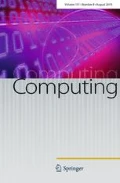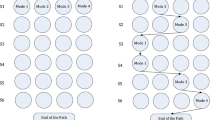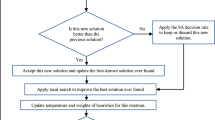Abstract
Meta-scheduling systems play a crucial role in scheduling jobs that are submitted for execution and require special attention because an increasing number of jobs are being executed using a limited number of resources. The primary problem of meta-scheduling is selecting the best resources (sites) to use to execute the underlying jobs while still achieving the following objectives: reducing the mean job turnaround time, ensuring site load balance, and considering job priorities. We introduce an enhanced meta-scheduling system, called Job Nature Meta-scheduling over Grid (JNMgrid), that achieves these objectives. JNMgrid consists of three components: (1) Job Analyzer and Monitor, which is responsible for determining the types of jobs in specific ratios; (2) Job Decider, which is responsible for matching the jobs with the appropriate resources; and (3) Job Batcher, which is responsible for determining the best number of jobs for execution. The performance of JNMgrid is compared with similar existing systems, such as Random, Queue Length, File Access Cost, and File Access Cost + Job Queue Access Cost. The simulation results demonstrate that JNMgrid outperforms these systems and can thus be deployed in any grid middleware to improve sharing of limited resources among grid users.
Similar content being viewed by others
References
Holtman K (2001) Cms data grid system overview and requirements. In: CMS Note 2001/037, CERN
(2010) Replica optimization service (ros) and european datagrid. http://edg-wp2.web.cern.ch/edg-wp2/optimization/ros.htm
Ho T, Abramson D (2005) The griddles data replication service. In: E-SCIENCE ’05: proceedings of the first international conference on e-science and grid computing. IEEE Computer Society, Washington, DC, pp 271–278
Foster I (2001) The anatomy of the grid: enabling scalable virtual organizations. In: Sakellariou R, Gurd J, Freeman L, Keane J (eds) Euro-Par’01 Parallel Processing. Lecture Notes in Computer Science, vol. 2150. Springer, Heidelberg, pp 1–4
Ferreira L, Berstis V, Armstrong J, Kendzierski M, Neukoetter A, Masanobu T, Bing R, Amir A, Murakawa R, Hernandez O, Magowan J, Bieberstein N (2003) Introduction to grid computing with globus. IBM Corp., Riverton
Xu MQ (2001) Effective metacomputing using lsf multicluster. In: IEEE international symposium on cluster computing and the grid, p 100
Feng H, Misra V, Rubenstein D (2007) Pbs: a unified priority-based scheduler. SIGMETRICS Perform Eval Rev 35(1): 203–214
Gentzsch W (2001) Sun grid engine: towards creating a compute power grid. In: Proceedings of the first IEEE/ACM international symposium on cluster computing and the grid, 2001, pp 35–36
Thain D, Tannenbaum T, Livny M (2005) Distributed computing in practice: the condor experience: research articles. Concurr Comput Pract Exp 17(2–4): 323–356
Bell WH, Cameron DG, Millar AP, Capozza L, Stockinger K, Zini F (2003) Optorsim: a grid simulator for studying dynamic data replication strategies. Int J High Perform Comput Appl 17: 403–416
Sakellariou R, Yarmolenko V (2008) Job scheduling on the grid: towards sla-based scheduling. In: High performance computing and grids in action. Advances in parallel computing, vol 16, pp 207–222
Hathaway J (1995) Service level agreements: keeping a rein on expectations. In: SIGUCCS ’95: proceedings of the 23rd annual ACM SIGUCCS conference on user services. ACM, New York, pp 131–133
Al-khateeb A, Abdullah R, Rashid NA (2009) Job type approach for deciding job scheduling in grid computing systems. J Comput Sci 5: 745–750
Jiang J, Ji H, Xu G, Wei X (2008) Scheduling algorithm with potential behaviors. J Comput 3(12): 51–59
Hur C, Kim Y (2009) Adaptive grid resource selection based on job history analysis using plackett-burman designs. In: Hong C, Tonouchi T, Ma Y, Chao CS (eds) Management enabling the future internet for changing business and new computing services. Lecture notes in computer science, vol. 5787. Springer, Berlin, pp 133–142
Elmroth E, Tordsson J (2008) Grid resource brokering algorithms enabling advance reservations and resource selection based on performance predictions. Future Gener Comput Syst 24(6): 585–593
Jin H, Shi X, Qiang W, Zou D (2005) An adaptive meta-scheduler for data-intensive applications. Int J Grid Util Comput 1(1): 32–37
Rasooli A, Mirza-Aghatabar M, Khorsandi S (2008) Introduction of novel dispatching rules for grid scheduling algorithms, pp 1072–1078
Zhang W, Fang B, He H, Zhang H, Hu M (2004) Multisite resource selection and scheduling algorithm on computational grid. In: International parallel and distributed processing symposium, vol 2, p 105a
Malarvizhi N, Uthariaraj VR (2009) A minimum time to release job scheduling algorithm in computational grid environment. In: International conference on networked computing and advanced information management, pp 13–18
Liu W, Kettimuthu R, Li B, Foster I (2010) An adaptive strategy for scheduling data-intensive applications in grid environments. In: IEEE 17th international conference on telecommunications (ICT), 2010, pp 642–649
Chang R-S, Lin C-Y, Lin C-F (2009) Scheduling jobs in grids adaptively. In: International symposium on parallel and distributed processing with applications, pp 19–25
McClatchey R, Anjum A, Stockinger H, Ali A, Willers I, Thomas M (2007) Data intensive and network aware (diana) grid scheduling. J Grid Comput 5: 43–64
Brandic I, Pllana S, Benkner S (2008) Specification, planning, and execution of qos-aware grid workflows within the amadeus environment. Concurr Comput Pract Exp 20: 331–345
Aktas MS, Fox G, Pierce M (2008) Information federation in grids. In: International conference on semantics, knowledge and grid, pp 109–116
Wolski R (1998) Dynamically forecasting network performance using the network weather service. Clust Comput 1(1): 119–132
Yousaf MM, Welzl M, Junaid MM (2007) Fog in the network weather service: a case for novel approaches. In: GridNets ’07: proceedings of the first international conference on networks for grid applications. ICST (Institute for Computer Sciences, Social-Informatics and Telecommunications Engineering), Brussels, pp 1–6
Ciliendo E, Kunimasa T (2007) Linux performance and tuning guidelines. International Technical Support Organization
Hoch D (2010) Linux system and performance monitoring. StrongMail Systems, Inc., Redwood City
Takefusa A, Matsuoka S, Casanova H, Berman F (2001) A study of deadline scheduling for client-server systems on the computational grid. In: International symposium on high-performance distributed computing, p 0406
Buyya R, Murshed M (2002) Gridsim: a toolkit for the modeling and simulation of distributed resource management and scheduling for grid computing. Concurr Comput Pract Exp 14(13–15): 1175–1220
Sulistio A, Poduval G, Buyya R, Tham C-K (2005) Constructing a grid simulation with differentiated network service using gridsim. In: 6th international conference on internet computing (ICOMP 2005), Las Vegas, NV
Legrand A, Marchal L, Casanova H (2003) Scheduling distributed applications: the simgrid simulation framework. In: Proceedings of the 3rd international symposium on cluster computing and the grid. CCGRID ’03. IEEE Computer Society, Washington, DC, pp 138–145
Mihai Dobre C, Stratan C (2004) Monarc simulation framework. In: Proceedings of the RoEduNet international conference. Timisoara, Romania
(2011) Chicsim the chicago grid simulator. http://people.cs.uchicago.edu/krangana/ChicSim.html
Song HJ, Liu X, Jakobsen D, Bhagwan R, Zhang X, Taura K, Chien A (2000) The microgrid: a scientific tool for modeling computational grids. Sci Program 8: 127–141
Bell WH, Cameron DG, Capozza L, Millar AP, Stockinger K, Zini F (2002) Simulation of dynamic grid replication strategies in optorsim. In: Proceedings of the third international workshop on grid computing. GRID ’02. Springer, London, pp 46–57
Cameron DG, Carvajal-Schiaffino R, Millar PA, Nicholson C, Stockinger K, Zini F (2003) Evaluating scheduling and replica optimisation strategies in optorsim. IEEE Computer Society, Washington, DC
Cameron DG, Carvajal-Schiaffion R, Ferguson J, Millar A, Nicholson C, Stockinger K, Zini F (2006) Optorsim v2.1 installation and user guide
Cms data challenge (2004). http://www.uscms.org/s&c/dc04/
Xhafa F, Abraham A (eds) (2008) Metaheuristics for scheduling in distributed computing environments. Springer, Berlin
Foster I (2006) Globus toolkit version 4: software for service-oriented systems. J Comput Sci Technol 21(4): 513–520
Author information
Authors and Affiliations
Corresponding author
Rights and permissions
About this article
Cite this article
Al-Khateeb, A., Rashid, N.A. & Abdullah, R. An enhanced meta-scheduling system for grid computing that considers the job type and priority. Computing 94, 389–410 (2012). https://doi.org/10.1007/s00607-011-0168-6
Received:
Accepted:
Published:
Issue Date:
DOI: https://doi.org/10.1007/s00607-011-0168-6
Keywords
- Meta-scheduling
- Grid site selection
- Job scheduling
- Job turnaround time
- Site load balancing
- Job type and ratio
- Job priority




